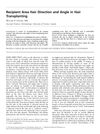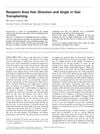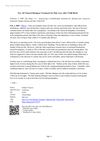Search
for
Sort by
Research
750-780 / 1000+ resultsresearch The Psychosocial Effect of Androgenetic Alopecia in Males and Females
Androgenetic alopecia negatively affects emotions and self-confidence, especially in younger people.

research Ethnodermatological Use of Medicinal Plants in India: From Ayurvedic Formulations to Clinical Perspectives – A Review
Indian herbal medicine shows promise for treating skin diseases but needs more research to prove effectiveness.
research PI3K-Akt-mTOR and Associated Signaling Pathways as Molecular Drivers of Immune-Mediated Inflammatory Skin Diseases: Update on Therapeutic Strategy Using Natural and Synthetic Compounds
Certain natural and synthetic compounds may help treat inflammatory skin diseases by targeting a specific signaling pathway.

research Telogen Effluvium: Acute and Chronic
Hair loss from telogen effluvium happens when a disturbance or imbalance causes hair to fall out prematurely.

research Real-Life Effectiveness and Tolerance of Baricitinib for the Treatment of Severe Alopecia Areata with 1-Year Follow-Up Data
Baricitinib effectively regrows hair in most people with severe alopecia, especially those with patchy hair loss, but hair may fall out again if treatment stops.
research Skin-On-A-Chip Strategies For Human Hair Follicle Regeneration
New technologies show promise for better hair regeneration and treatments.
research Role of Iron Deficiency in Chronic Hair Loss
Iron deficiency is a common nutritional cause of hair loss.

research Retrospective Diagnosis of Intrauterine Diselementosis in Newborn Calves
The conclusion is that normal trace element levels in newborn calves' hair are between the 25th and 75th percentiles, and levels outside this may indicate diselementosis.

research Hair Follicle Biology and Topical Minoxidil: Possible Mechanisms of Action
Minoxidil stimulates hair growth by increasing hair thickness and prolonging growth phase.

research The Basic Science of Hair Biology
Hair disorders are caused by a complex mix of biology, genetics, hormones, and environmental factors, affecting hair growth and leading to conditions like alopecia.

research Recipient Area Hair Direction and Angle in Hair Transplanting
The paper concludes that copying the natural direction and angle of hair in transplants is key for a natural look and doesn't harm hair survival.

research Recurrent Episodes of Hair Loss in a 37-Year-Old Woman
The woman's hair loss was mainly due to stress and low iron levels, and her hair grew back after treatment.

research Recipient Area Hair Direction and Angle in Hair Transplanting
Dr. Walter P. Unger suggests that copying a person's natural hair direction and angle during transplants leads to a more natural and fuller appearance.

research Hair Loss
The article concludes that hair loss has many causes and treatments, with medication options like finasteride and minoxidil for men, and minoxidil, hormones, or iron for women, while warning against unproven remedies.

research Hair Loss in Women
Over one-third of women experience hair loss, with female-pattern hair loss being most common, and treatments include minoxidil and possibly hair transplantation.

research Hair Growth Regulation by the Extract of Aromatic Plant Erica Multiflora
Erica multiflora plant extract can help hair grow by stimulating growth-related cells and triggering hair cycle changes.

research Dietary Vitamin A Regulates Wingless-Related MMTV Integration Site Signaling to Alter the Hair Cycle
Eating vitamin A affects hair growth and health by changing cell signals in mice.

research Carbamazepine-Induced Hair Loss: A Case Report
Carbamazepine can cause hair loss, which may reverse when the medication is stopped.

research Hair Loss in Children: Causes, Impact, and Management
Children's hair loss has many causes and requires careful diagnosis and personalized treatment, including emotional support.

research Revision Surgical Hair Restoration: Repair of Undesirable Results
Unsatisfactory hair restoration results can be significantly improved with strategic hair redistribution and new donor hair placement, despite previous surgery challenges.

research Advances in Hair Diseases
The review highlights the importance of stem cells in hair health and suggests new treatment strategies for hair loss conditions.

research Hair Loss in Women: Causes and Treatments
About 40% of women by age 60 experience significant hair loss, often due to androgenetic alopecia, with treatments like minoxidil available and hope for future cures.

research Hair Today, Gone Tomorrow: Potential of Tofacitinib and Ruxolitinib in Treating Hair Loss
Two drugs, tofacitinib and ruxolitinib, may help regrow hair by activating hair follicles.

research New All Natural Shampoo Treatment for Hair Loss After Childbirth
The new all-natural shampoo treatment can prevent hair loss and encourage hair regrowth in new mothers.

research 55 Cases of Allergic Reactions to Hair Dye: A Descriptive, Consumer Complaint-Based Study
Many people had severe allergic reactions to a common hair dye ingredient, causing them to seek medical care and miss work.

research Evaluation and Diagnosis of the Hair Loss Patient
To diagnose hair loss, use a systematic approach including history, exams, and tests.

research Hair and Scalp Disorders in Ethnic Populations
Different hair care practices and conditions affect African American hair and scalp health, requiring specialized knowledge for treatment.

research Studies on the Proteome of Human Hair: Identification of Histones and Deamidated Keratins
Human hair contains diverse proteins, including keratins and histones, which could help assess hair health and aging.

research Molecular Genetic and Endocrine Mechanisms of Hair Growth
Hormones and their receptors, especially androgens, play a key role in hair growth and disorders like baldness.